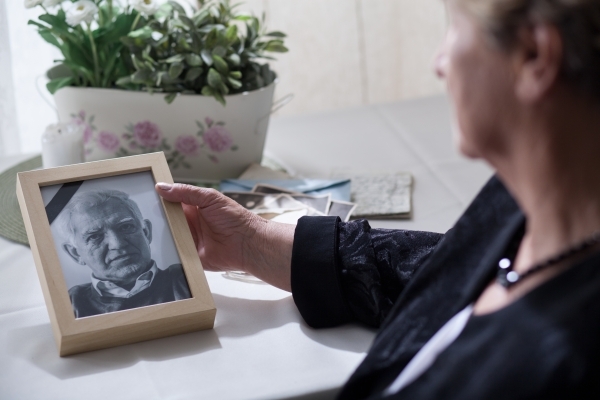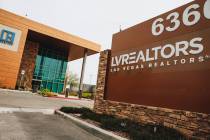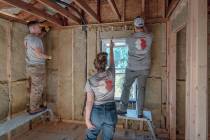How to keep the home after the death of a spouse who got a reverse mortgage
Widows and widowers may be able to keep their homes even if they weren't named as borrowers on their spouses' reverse mortgages.
The ability to remain in the home comes courtesy of an FHA program called the Mortgagee Optional Election assignment. The program permits the lender to allow a surviving spouse to continue to live in the home, even when the surviving spouse isn't listed on the loan document as a borrower, says Sarah Mancini, an attorney at the National Consumer Law Center, a nonprofit consumer advocacy organization in Washington, D.C.
When your spouse got a reverse mortgage, without putting your name on the loan, you can be at risk of losing the home after your spouse dies. The Federal Housing Administration's Mortgagee Optional Election assignment program is designed to allow nonborrowing widows and widowers to keep their homes.
1. You must have been married when your spouse got the reverse mortgage, and you must have remained married.
2. The home has to be your principal residence.
3. Taxes and insurance must be paid up.
4. Contact the mortgage servicer to request an MOE assignment.
What is a reverse mortgage?
Reverse mortgages allow homeowners who are 62 or older to borrow against home equity and receive a lump sum, line of credit or fixed amount every month without having to make monthly payments.
Almost all reverse mortgages are Home Equity Conversion Mortgages, insured by the Federal Housing Administration.
When a reverse-mortgage borrower dies, the loan becomes due and payable. That means when a reverse mortgage is taken out by only one spouse in a married couple, the other spouse can be at risk of losing the home after the borrower's death. The FHA designed the MOE assignment program to prevent nonborrowing spouses from losing their homes.
Rules for MOEs
Below is a summary of some of the MOE program's guidelines that allow nonborrowing widows and widowers to remain in their homes.
Marriage requirements
The spouses must have:
* Been married at the time the reverse mortgage was originated.
* Remained married until the borrower's death.
Same-sex spouses who couldn't legally marry in their state when the loan was made but married later can qualify.
State-recognized common-law marriages and civil unions also could be accepted, but spouses who came into the picture after the loan was made aren't covered by this program.
Residency requirements
The surviving spouse:
* Must have occupied the home as a principal residence at the time the reverse mortgage was originated.
* Must still live in the home and have marketable title to the home or a legal right to live there for the rest of his or her life.
Marketable title or a lifelong legal right of residency must be obtained within 90 days of the borrower's death, according to the Department of Housing and Urban Development guidelines.
A spouse who moves out, say, into a hospital or care facility, for an extended time might not be able to reoccupy the property. Short-term absences are permitted.
Taxes, insurance
The reverse mortgage cannot be in default, which means the property taxes and homeowners insurance must be paid up.
This requirement "could be a hurdle for a lot of people," Mancini says, adding that an existing repayment plan for a borrower who fell behind probably would be canceled when he or she died.
"The spouse has to be able to pay the entire amount if they want to have the loan assigned to HUD through this program," she says.
A nonborrowing spouse who remains in the home cannot receive any additional money from the reverse mortgage.
Eligibility for MOEs
The program applies only to reverse mortgages originated before Aug. 4, 2014. Reverse mortgages originated after that date were better designed to protect nonborrower surviving spouses.
"If your spouse has a HECM that was taken out after Aug. 4, 2014, your life is a little easier because you don't have to go through this program," Mancini says. "There should not be any problem when a spouse passes away."
Steps to take
Contact the servicer if you want to request an MOE assignment or have questions about how to do so, says Amy Ford, director of home equity initiatives for the National Council on Aging, a seniors' services and advocacy organization in Arlington, Va.
"It does take some effort, and especially considering you've just lost a spouse, it's a very stressful time," Ford acknowledges. "But if you want to be able to stay in the home, contacting the loan servicer and being able to execute on these technical pieces — the paperwork — would be important."
Other options
For surviving spouses who don't qualify for an MOE assignment, options include:
* Paying off the loan. A reverse mortgage can be satisfied by paying the total amount due or 95 percent of the home's appraised value, whichever is less.
* Refinancing the loan.
* Selling the home.
"There are ways to avoid having the house go away," Mancini says, "but people need to have a plan to deal with it. Otherwise, it would presumably go into foreclosure."
It's the lender's call
"If you meet all the criteria, the mortgage lender will assign the loan to HUD. HUD will hold on to the loan and let you keep living there as long as you live and are residing in the house," Mancini says.
Still, the decision is "up to the lender," says Peter Bell, CEO of the National Reverse Mortgage Lenders Association.
"It's a right that the lender has to not enforce the terms of its contract," he says. "There's no reason a lender wouldn't do it, but the borrower has to be able to pay taxes and insurance and keep the home maintained."























